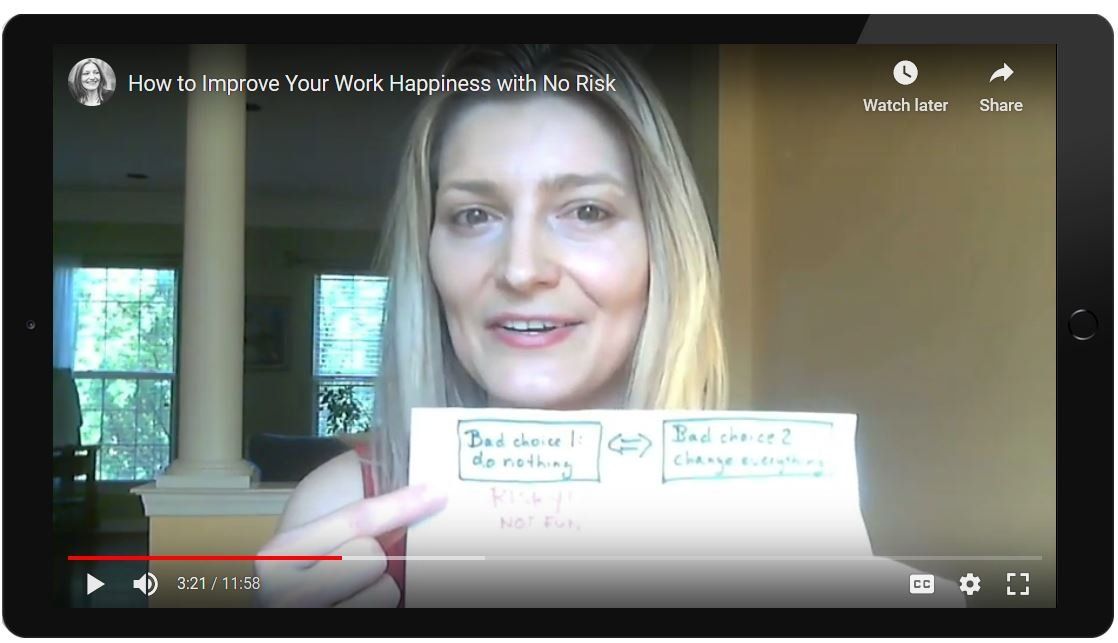How to Know When to Quit Your Job
How can you gain clarity on when to quit your job
(and if you should even do it)?
Well, I have an exercise for you to help you gain some insights about that. Watch the video and/or continue reading below.
For a moment, imagine the following situation:
It has gotten dark outside when you hear the knock at your door.
You are startled for a moment. It’s late and you’re not expecting anyone.
The knocking continues. Whoever it is sounds quite persistent. Should you open?
Your
intuition tells you that it’s someone you know. Someone who plays a big
part in your life. And someone you shouldn’t ignore.
With a sigh, you get up.
You open the door. Suddenly, you find yourself face-to-face with your late-night visitor.
“Who are you?” You’re certain that you have never
seen this person before in your life. And yet, something seems familiar.
Before your visitor can respond, you know the answer to your own question .
Beyond the shadow of a doubt. The person standing at your doorstep is… your work.
Let’s step back for a second.
In 1982, the English punk rock band The Clash released a song called: “Should I stay or should I go.”
If you’re like some of my clients, you might ask yourself that question when it comes to your work. And, you might consider many different variables to answer whether you should stay or go.
The problem with all these variables is that it can get really difficult to make the right decision.
And, sometimes it can be hard to see the forest for the trees.
Is there perhaps a different way to find answers?
Instead of ruminating about “work satisfaction,” or “engagement
at work,” it’s also possible to imagine one’s current work as a (fictional) relationship
partner and to then assess the state of that relationship.
Considering work from such a relationship angle is unusual, for sure. But it is
also more intuitive than other approaches.
After all, humans have been in relationships with other people for a really,
really long time---even before our ancestors started using language to
communicate. In contrast, our “level of engagement” in a line of “work” that
might not even have existed 100 years ago is a much more abstract concept.
How to use this approach to get clarity about whether you should leave your work:
Let’s get back to your late-night visitor who’s standing in front of your door. As you’re considering this person, ask yourself the following 4 questions.
It might be helpful to write down the answers.
1) If your current work was an actual person, what type of relationship partner would they be?
Maybe they would be a generous, loving person to be in connection with. Or perhaps they would be a harsh, critical partner. Or your work might be a challenging partner in other ways, for instance, by being flakey and unreliable.
Whatever response comes to you, allow yourself the space to let this be. The answer to this question might be painful---and while it’s uncomfortable to feel this, it’s also okay. Things can change. However, for something to change, it’s often necessary to face what’s really going on in the first place.
Example: “Phew. So if my work was a person, they’d be downright abusive! Truth be told, I’d want to get a restraining order. I wouldn’t want them anywhere near me or anyone I care about!”
2) If your current work was an actual person, how would you feel towards them?
You might feel love and appreciation towards them. Or maybe you’d wish that they’d be elsewhere so you could have your peace. You might feel trapped by them and considering ditching them for someone else, or you may feel a combination of different things for them.
Again, whatever comes up in response to this question, allow yourself to feel this. It’s courageous to ask these questions, and the courage to face uncomfortable situations in your life can be extremely valuable in creating what you most want.
Example: “If my work was a person, I’d feel afraid of them. I’d also feel very unsafe around them.”
3) If your current work was an actual person you’re in a relationship with, how would they affect the rest of your life?
Maybe they’d think that it’s important that you also have a life outside your relationship with them and they’d give you enough space to stay in touch with your family and friends. Or perhaps they’d demand that you spend all your time and energy with them.
Depending on your situation, your answer to these questions can be painful. Still, in the long run, it’s often more painful to not face certain truths.
Example: “If my work was a person, they’d be controlling and have no regard for my needs. Also, my health and wellbeing would suffer, the longer I stayed with them.”
4) If your current work was an actual person you’re in a relationship with, what would need to change for you to be happy with them?
Perhaps there are only little changes you’d like to see. Or maybe you’d feel undervalued by them and you’d want more recognition. It’s also possible that you’d feel that you need to do something differently---for instance, by being more appreciative of them. Maybe you’d like to try harder. Or perhaps you’d feel there’s simply no way to rescue the relationship.
If this question leads to practical suggestions, it can be helpful to jot them down.
Example: “Are you kidding me? If my work was a person, there’s no way I’d be happy being in a relationship with them. They’d have to do a complete 180. I really don’t see that happening. Hmm… maybe I really need to get out of there.”
In closing
The process of asking these 4 questions might have brought up a lot of things for you. Perhaps it has revealed some truths about your situation. Or maybe it has led you to reconsider certain things. Whatever the case for you, it’s important to take some time considering these answers, instead of rushing into action.
Creating a healthy relationship takes time. Some relationships are not meant to be, whereas others get better if you pour your heart and your effort into it. Whatever category your current work situation falls into, thinking of it as a relationship might help you get clearer on if and when to quit your job.
And, as H. Jackson Brown, Jr. pointed out: “Remember that no relationship is a total waste of time. You can always learn something about yourself.”




